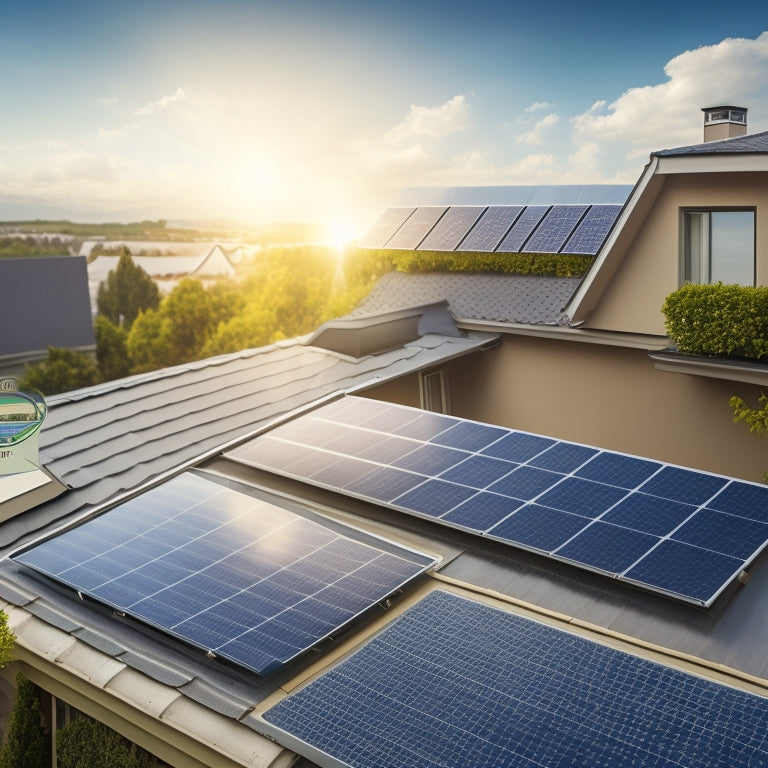
Understanding Residential Solar Panel Installation Warranties
Share
When you invest in a residential solar panel installation, you expect a comprehensive warranty package that covers the system's performance, components, and workmanship for a specified period, typically ranging from 10 to 30 years. This all-encompassing warranty package provides protection against defects and malfunctions, giving you peace of mind. You'll want to understand the types of warranties, including product performance guarantees, workmanship warranties, and panel durability assurances. As you explore your warranty, you'll discover the details of manufacturer warranties, installation company warranties, and workmanship guarantee periods. And, there's more to uncover about warranty claims, transferability, exclusions, and extended options, which can further clarify your understanding of your residential solar panel installation warranty.
Key Takeaways
• A thorough warranty package covers system performance, components, and workmanship for a specified period, typically 10 to 30 years.
• Three types of solar panel warranties include product performance guarantees, workmanship warranty coverage, and panel durability assurances.
• Manufacturer warranties typically last 25 to 30 years, covering defects in materials and workmanship, and ensuring a guaranteed level of performance.
• Installation company warranties cover workmanship and installation for 5 to 10 years, providing peace of mind for correction of installation issues.
• Understanding warranty coverage details, management, and limitations is crucial to making informed decisions and avoiding unexpected expenses.
What to Expect From a Warranty
When considering a residential solar panel installation, you can expect a thorough warranty package that covers the system's performance, components, and workmanship for a specified period, typically ranging from 10 to 30 years. This inclusive warranty package is designed to provide you with peace of mind, ensuring that your investment is protected against defects, malfunctions, and subpar performance.
It's important to have realistic warranty expectations and understand what's covered under the warranty. Warranty education is essential in this regard, as it helps you make informed decisions and avoids potential disputes.
You should expect a clear outline of the warranty terms, including the duration, scope, and process for filing claims. A reputable solar panel installer will provide a detailed warranty document, explaining the coverage, limitations, and maintenance requirements.
Types of Solar Panel Warranties
When you invest in a residential solar panel installation, you'll typically receive multiple warranties that cover different aspects of the system.
You'll want to understand the specific types of warranties offered, which can include:
- A product performance guarantee
- Workmanship warranty coverage
- Panel durability assurance
Product Performance Guarantee
A product performance guarantee secures that your solar panel system operates at a minimum level of efficiency, typically 80% or higher, over a specified period, usually 25 years. This guarantee ensures that your solar panels will continue to generate power at a certain level, providing you with a predictable energy yield. You can expect your solar panel system to produce a certain amount of power output, and the manufacturer guarantees that it will meet or exceed that level. If your system's power output falls below the guaranteed level, the manufacturer will repair or replace the defective panels.
As a homeowner, you want to make sure that your solar panel system is performing at its best. A product performance guarantee gives you peace of mind, knowing that your system will continue to generate electricity at a high level of efficiency. This guarantee also provides protection against defects in materials and workmanship, ensuring that your solar panel system will continue to meet your energy needs.
Workmanship Warranty Coverage
In addition to the product performance guarantee, a thorough solar panel installation warranty should also include a workmanship warranty that covers defects in installation, guaranteeing that your system isn't only generating power efficiently but also installed correctly to last for years to come. This type of warranty protects you from subpar installation work, providing peace of mind and safeguarding your investment.
Here are some key aspects of a workmanship warranty:
-
Contractor obligations: Clearly outlines the contractor's responsibilities in case of installation defects or issues.
-
Installation standards: Ensures that the installation meets industry standards and local building codes.
-
Repair and replacement: Covers the cost of repairing or replacing defective components or reinstalling the system if necessary.
- Warranty duration: Specifies the length of time the workmanship warranty is valid, typically ranging from 1 to 10 years.
A detailed workmanship warranty demonstrates a contractor's commitment to quality and accountability. It's important to carefully review the warranty terms and conditions to make sure you're protected in case something goes wrong.
Panel Durability Assurance
You'll want to guarantee your solar panel system is supported by a thorough warranty that covers the durability of the panels themselves, which is where panel durability assurance comes in. This type of warranty ensures that your solar panels can withstand the elements and maintain their performance over time.
A reputable manufacturer will subject their panels to rigorous weather resistance testing, simulating extreme weather conditions to make sure they can withstand the harshest environments. Additionally, material quality control is important in ensuring the durability of the panels. This involves strict inspections and testing of the materials used in the manufacturing process to guarantee their quality and reliability.
A detailed panel durability assurance warranty will typically cover defects in materials and workmanship for a period of 25 years or more. This provides you with peace of mind, knowing that your investment is protected and your solar panel system will continue to generate power efficiently for years to come.
Manufacturer Warranty Coverage
Your solar panel manufacturer typically provides a warranty that covers defects in materials and workmanship, guaranteeing a certain level of performance over a specified period. This warranty is usually included in the initial purchase price, so you don't need to worry about additional warranty costs. The warranty coverage period typically ranges from 25 to 30 years, depending on the manufacturer.
Here are some key aspects of a manufacturer's warranty:
-
Coverage Period: The warranty period during which the manufacturer guarantees the performance of your solar panels.
-
Warranty Cost: Usually included in the initial purchase price, so you don't need to pay extra for warranty coverage.
-
Performance Assurance: The manufacturer ensures that your solar panels will produce a certain amount of electricity over the warranty period.
- Defect Coverage: The warranty covers defects in materials and workmanship, so you're protected against faulty panels.
Installation Company Warranty
The installation company warranty, which typically ranges from 5 to 10 years, covers the workmanship and installation of your solar panel system. This warranty provides you with peace of mind, knowing that the installation company will correct any issues related to the installation, such as faulty wiring or improper mounting.
When evaluating an installation company, it's essential to consider their company reputation and licensing requirements. A reputable company with the necessary licenses and certifications will provide a higher level of assurance that the installation will be done correctly. You should look for companies with certifications from organizations like the North American Board of Certified Energy Practitioners (NABCEP) and licenses from the state and local authorities.
Workmanship Guarantee Period
When evaluating a workmanship guarantee period, you'll want to examine the installation coverage period, which typically ranges from 2 to 10 years. This period determines how long you're protected against defects or poor workmanship in the installation.
Be sure to also review the warranty coverage limits, which specify the maximum amount the installer will pay to correct any issues that arise during the guarantee period.
Installation Coverage Period
Installation Coverage Period
How long can you rely on your solar panel installer to fix mistakes or defects in their workmanship, and what exactly is covered during this period? The Installation Coverage Period, also known as the Workmanship Guarantee Period, is a critical component of your residential solar panel installation warranty.
Here are the key aspects of this period:
-
Coverage duration: Typically ranges from 1 to 10 years, depending on the installer and local regulations.
-
Installation timeline: This period usually begins on the installation completion date.
-
Workmanship defects: The installer is responsible for fixing any defects or mistakes in their work, including faulty wiring, improper panel installation, or roofing issues.
- Repair and replacement: The installer will repair or replace defective parts, and ensure the system operates as intended.
During this period, you can rely on your installer to correct any mistakes or defects in their work, giving you peace of mind and ensuring your solar panel system operates efficiently.
Warranty Coverage Limits
When reviewing your residential solar panel installation warranty, it's important to understand the limits of your installer's workmanship guarantee, which may impact the scope of repairs and replacements during the coverage period.
You'll want to know the warranty coverage limits, as they can affect your out-of-pocket expenses in case of system failures or malfunctions. Typically, installers set insurance caps, which are the maximum amounts they'll pay for repairs or replacements. Be aware of these caps, as they may not cover the full cost of repairs, leaving you with unexpected expenses.
Moreover, policy gaps can occur when the warranty doesn't cover specific components or issues. For instance, the warranty mightn't cover damage caused by natural disasters or extreme weather conditions. It's important to review your warranty contract carefully to identify any policy gaps and understand what's not covered.
Warranty Claims and Process
You'll need to carefully review your warranty terms to understand the process for submitting a claim and the required supporting documentation. This is essential in case you need to file a claim due to a defective or malfunctioning solar panel system.
When submitting a claim, be prepared to provide detailed warranty paperwork, including proof of purchase, installation records, and maintenance history. Failure to provide adequate documentation may result in claim denial.
Here are some essential steps to keep in mind when filing a warranty claim:
-
Review warranty terms: Understand the specific process and requirements for submitting a claim.
-
Gather documentation: Collect all necessary paperwork, including proof of purchase, installation records, and maintenance history.
-
Submit a detailed claim: Provide a clear, concise description of the issue, including photos and videos if applicable.
- Respond promptly to requests: Be prepared to provide additional information or clarification as needed.
Warranty Transferability Options
As you navigate the warranty process, it's also important to contemplate what happens to your warranty coverage if you decide to sell your home or transfer ownership of the solar panel system. You'll want to understand the warranty transferability options, ensuring that your investment maintains its value.
Warranty flexibility is vital in maintaining resale value. A transferable warranty can be a substantial selling point, providing peace of mind for potential buyers. Here's a breakdown of common warranty transferability scenarios:
| Scenario | Warranty Coverage | Transferability |
|---|---|---|
| Original owner sells home | Remains in effect | Fully transferable |
| Original owner transfers system | Remains in effect | Fully transferable |
| New owner installs additional panels | Pro-rated coverage | Partially transferable |
| System is relocated | Voided | Not transferable |
| Original owner's warranty expires | Voided | Not transferable |
When evaluating solar panel installation warranties, consider the warranty transferability options and their impact on resale value. A flexible warranty that allows for seamless transfer can greatly enhance your system's appeal to potential buyers.
Warranty Exclusions and Limitations
When examining your solar panel installation warranty, it's important to pay close attention to the fine print, as warranty exclusions and limitations can greatly affect your system's overall reliability and maintenance costs.
You may think you're fully covered, but warranty loopholes can leave you with unexpected expenses. It's vital to understand what's not covered to avoid surprises down the line.
Here are some common warranty exclusions and limitations to watch out for:
-
Natural disasters: Damage from earthquakes, hurricanes, or other natural disasters may not be covered.
-
Improper installation: If the installation wasn't done correctly, the warranty might be void.
-
Neglect or misuse: Failure to maintain your system or using it in a way that's not recommended can lead to denied claims.
- Third-party damage: Damage caused by external factors, such as vandalism or animal infestation, may not be covered.
Be sure to carefully review your warranty document to understand the exclusion clauses that apply to your system. Don't assume you're fully protected – know what's excluded to avoid costly surprises.
Extended Warranty Options
Your solar panel installation warranty may offer extended warranty options that provide additional protection and peace of mind beyond the standard warranty period. These extended warranty options can give you more thorough coverage, reducing the financial burden of unexpected repairs or replacements. By investing in extended warranty options, you can enjoy extended benefits, such as longer warranty periods, priority customer support, and enhanced maintenance services.
Here's a comparison of extended warranty options:
| Warranty Upgrades | Extended Benefits |
|---|---|
| 10-year extended warranty | Priority customer support |
| 15-year extended warranty | Enhanced maintenance services |
| 20-year extended warranty | Dedicated technical support |
| Premium warranty package | On-site troubleshooting |
| Customized warranty solutions | Priority repair scheduling |
When considering extended warranty options, weigh the costs against the potential savings and peace of mind. Keep in mind that not all extended warranty options are created equal, so carefully review the terms and conditions before making a decision. By choosing the right extended warranty option, you can guarantee your solar panel installation continues to perform effectively while minimizing unexpected expenses.
Frequently Asked Questions
Can I Cancel My Warranty if I'm Unhappy With the Installation?
When darkness falls on your solar dreams, you're stuck with a faulty installation, and frustration fuels your desire to cancel the warranty. You can dispute the contract, but be prepared for potential lawsuits, and if successful, fight for a warranty refund.
Are Warranties Affected by Selling or Transferring My Property?
'When you sell or transfer your property, you'll typically need to transfer the warranty to the new owner, mitigating ownership risks; however, it's important to review the warranty terms to guarantee a seamless property transfer process.'
Will My Warranty Still Be Valid if the Manufacturer Goes Bankrupt?
Did you know that 50% of solar manufacturers went bankrupt between 2010 and 2013? If your manufacturer goes under, don't panic - look for bankruptcy clauses and insolvency protection in your warranty, which should guarantee your coverage remains valid.
Can I Purchase a Warranty for a System Installed by Another Company?
You can purchase a warranty for a system installed by another company, but make sure system compatibility and verify the warranty provider's coverage and terms, as not all providers offer warranties for third-party installations.
Are Warranties Prorated or Fixed-Rate for the Entire Coverage Period?
When evaluating warranties, you'll encounter prorated or fixed-rate structures. Prorated warranties decrease in value over time, while fixed-rate warranties maintain the same rate throughout the coverage period, affecting your warranty calculations and overall rate structures.
Related Posts
-

5 Tips for Efficient Last Mile EV Delivery
You're looking to supercharge your last mile EV delivery operations. Start by optimizing your fleet operations to red...
-

Selecting Solar Panel Kits for Boat and RV Owners
When selecting a solar panel kit for your boat or RV, you'll want to calculate your daily energy consumption in watt-...
-

5 Best Online Stores for Green Vehicle Solutions
You're on the hunt for an eco-friendly ride, and online stores are a great place to start. You'll find top retailers ...


